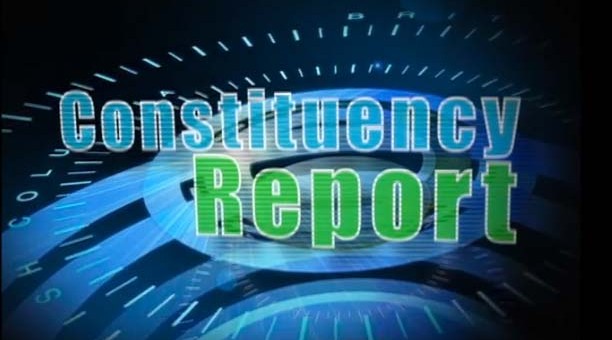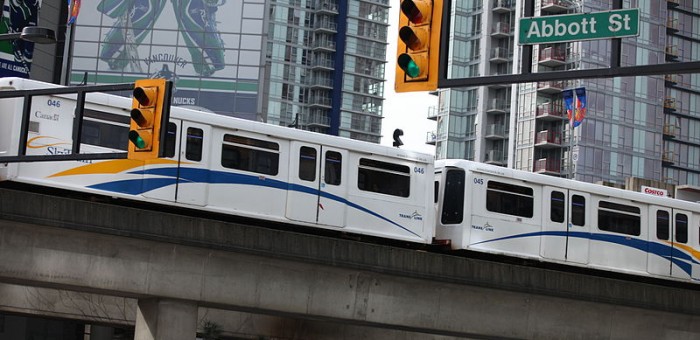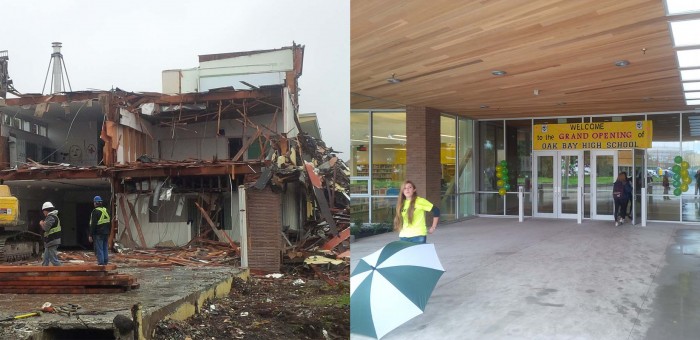Constituency Report – October 2015
Constituency Report is a public service that Shaw TV graciously offers MLAs. This month’s video is provided below.
Judy Fainstein and I tried something different this time. For the first segment we discussed legislative issues relevant to Oak Bay-Gordon Head and British Columbia in general. In the second segment, I introduced Rory Hills, a recent graduate from Oak Bay High School. Rory and I had a wide-ranging discussion on the topic of youth engagement in politics.
I’d be interested in your feedback on this constituency report.
Constituency Report
Dementia-Friendly Communities Workshop
I was pleased to co-host a recent workshop provided by the Alzheimer Society of B.C. at Berwick House Retirement Community in Gordon Head. The workshop was given by Rebecca Morris, Provincial Coordinator, Advocacy & Public Policy at the Alzheimer Society of B.C. This highly informative presentation provided valuable information about dementia and how we can create more supportive communities for people with dementia, their families and caregivers. The Alzheimer Society of B.C. is the leading source of education, support, services and information for people affected by dementia.
‘Help for Today. Hope for Tomorrow…®’ is the Society’s tagline and we know education is key to reducing the stigma and judgement of those 70,000 British Columbians who live with dementia – 10,000 of whom are under the age of 65. It is estimated that, in 30 years, more than 177,000 British Columbians will be living with the disease.
The goal of the Dementia-Friendly Communities campaign is to create heightened awareness about dementia and to support people with dementia to participate in their communities to the fullest extent possible.
We all have a role in creating dementia friendly communities, as we were told by Mr. Jim Mann, who was a speaker during the presentation. Jim, who was diagnosed with dementia at the age of 58, is part of the BC leadership Group with the Alzheimer Society of B.C. and he shared his story and personal experience with us. Jim spoke of his journey with humour, acceptance and openness. He told us he is willing to “talk to anyone” in his tireless quest to “advocate to educate”. Clearly, Jim is a rock star for the organization.
Five things to share about dementia:
- It is not a natural part of aging.
- It is not just about losing your memory – it can affect thinking, communicating and doing everyday activities.
- It is possible to live well with dementia.
- There is more to a person than a diagnosis of dementia.
- The Alzheimer Society of B.C. is here to help.
Some useful myth-busting in the presentation taught us that dementia is not….
- Strictly a genetic disorder
- A disease that only affects older people
- Normal aging/memory loss
- Preventable
- Curable
- Caused by aluminum
- The end of a meaningful life
- That a person cannot understand what is going on around them
- That a person will become violent or aggressive
There is help and there are resources available! You can request a presentation from the Alzheimer Society by emailing dementiafriendlybc@alzheimerbc.org to find out more. You can help spread awareness by encouraging others to become Dementia Friends at www.dementiafriends.ca
The First Link Dementia Helpline is the first number to call for information. The Helpline is at: 1-800-936-6033 or (for the Lower Mainland) 604-681-6530.
The Alzheimer Society of B.C. provides much more valuable information and resources on their website.
I am very grateful to Rebecca and Jim for their excellent presentation and also want to extend my sincere thanks to Berwick House for welcoming us, providing refreshments and such a comfortable space for us to learn about the important work of the Alzheimer Society of B.C.
Bill 37 — The Comma and Spellchecker Act
As I mentioned earlier, we’ve had a couple of odd bills introduced during this legislative sitting. In the case of Bill 37, the Miscellaneous Statutes Amendment Act, (No. 2), 2015, things are no different. The government introduced a bill that simply corrected a few commas, a bracket that shouldn’t have been italicized, and a couple of spelling mistakes.
Below is the text of my not to be taken too seriously comments on Bill 37. I encourage those interested in other comments on this bill to read the Hansard transcript of Leonard Krog’s second reading speech. He had me in stitches as he unpacked the (non)complexity of the bill.
Text of Speech
A. Weaver: I bound to my feet in enthusiasm to speak in support of Bill 37, the Miscellaneous Statutes Amendment Act, (No. 2), 2015. Like my colleague from Nanaimo, I have been waiting many months to read about the many provisions that have been made here with respect to commas and periods.
Now, I take social media very, very seriously. I believe it’s important, as legislators, for us to engage our constituents and ask them what their views are on bills. So I form my opinion based on the opinions of the constituents and the input I get from talking to my staff and so forth. Now, I had a torrent of information come my way — really, more enthusiasm as to this bill. I had a couple of other suggestions that I think are relevant, and I think a couple of them should be read in because there are new ideas that the people of British Columbia are bringing to this government.
They’ve offered me an opportunity to give this government some more ideas for bills that they can bring forward this session to complete the legislative agenda. Here are a couple — I quite like these — from a fellow called Dave Hutchinson. He suggested Bill 39 be introduced — an act to replace the dash with the semicolon. I’m impressed with that. He has also suggested Bill 40, the act to eliminate redundancies act. Quite clever, actually.
We’ve had a comment from an Andrew Park, who was quite taken aback by the fact that the government’s agenda seemed so void of ideas. He said: “What’s up next — a bill to outlaw the selling of Twinkie bars in months that have two full moons?” Now, hon. Speaker, you will not believe it. It must have been a boring day on Facebook, because a discussion ensued, after that comment, as to whether or not you could still buy Twinkie bars in Canada. That’s the level of discussion that this bill is provoking in British Columbia. Turns out, there is good news. I was able to provide my constituents with an address that they could write to, to order Twinkies on line.
But it doesn’t end there. There have been other ideas. Truly my favourite, which we could debate for probably a couple of days, was suggested to me by my press secretary. That would be Bill 41. And those going back as far as my fellow alumnus Pierre Berton, a 1937 grad from Oak Bay that I mentioned in a statement today…. Sadly and ironically — just a sidebar with respect to the statement. For the first time in recorded memory, the Hansard blacked out. But it didn’t black out; it greened out. A green screen came up through my statement, so it’s no longer available as a video with other than a green screen there. Appropriate? Perhaps it’s seeing something in the future, I don’t know. But let’s come back to the bill. I sway. I move off it.
Bill 41, Mat Wright, press secretary: the double space after a period re-enactment bill, 2015. Say it again: the double space after a period re-enactment bill, 2015. That’s an issue that we should debate. Some people, sloppily, only put one space after a period. Within the legislation here, there are sometimes two spaces, sometimes one. We should have consistency on this — consistency.
Bill 42, the wilful and willingly act of willingness act, 2015. Bill 43, the healthy heath act, 2015. And one that I’d like to expand upon further, Bill 44, the two l’s or one act of decision, 2015.
Let me expand upon that a bit more. You know, we wonder whether “wilful” was willingly and wilfully worded wisely in the bill brought before us. Why I say that is that it appears, as the member for Nanaimo pointed out, that government has chosen to pay tribute to my former alumnist Pierre Berton from Oak Bay but has done so not consistently. It turns out that there are a further 15 acts that have spelled “wilful” wrong, one of them being — and I say this with the deepest sadness and shame on the government — the School Act. Heaven forbid that the School Act is not being corrected to change the way “wilful” is spelled. Yet we are doing it in others.
The Community Charter, Insurance Premium Tax Act, the Local Government Act, the Logging Tax Act, the Maa-nulth First Nations Final Agreement Act, the Mineral Tax Act, the Motor Fuel Tax Act, the Perpetuity Act — I don’t even know what some of these are — the Personal Property Security Act, the Property Transfer Tax Act, Railway Act, Tobacco Tax Act — we’re amending that one; that’s good — Trustee Act, and Tsawwassen First Nation Final Agreement Act.
Why are we just wilfully changing the spelling of “wilful” in a couple of acts when staff, in a matter of literally maybe 30 seconds — maybe it was 45 seconds — did a simple Google search with “site: B.C. Laws” and you can find all these other acts that have the misspelling. I don’t really quite know what’s going on here, but it actually goes further.
There’s an inconsistency with the use of the number of l’s and in other areas. One of my staff researchers gave me a lot of fuel to actually further this discussion. “Fuelled” is either spelled with one l or two l’s throughout the legislation in British Columbia. It’s sloppy. The environment act, the Environment Management Act, the Clean Energy Act, the Motor Vehicle Act, the Safety Standards Act and the Wildfire Act — the regulations there — have “fuelled” spelled with double l’s.
“Fuelling” is spelled with double l’s in the Assessment Act, the Nisga’a Final Agreement Act, the Park Act, Tsawwassen First Nation Final Agreement Act, the Clean Energy Act regulations, the Environment Management Act regulations, the Greenhouse Gas Reduction Act regulations, the Utilities Commission Act regulations.
Yet single l’s in “fueled” are used in the Local Government Act, the Wildfire Act and regulations, the Workers Compensation Act regulations, and “fueling” with single l’s is used in Forest and Range Practices Act regulations, the Wildfire Act and regulations and so forth. In fact, what’s even worse is that in some, double l’s are used and single l’s are used, so it’s not only inconsistent across laws but within laws.
The same thing. As you travel through these documents, you quickly realize that “travelled,” indeed, also is spelled with single l’s or double l’s. I won’t belabour the point. But why I’m raising this, honourable speaker….
Interjection.
A. Weaver: The hon. member for Nanaimo, very hon. member, points out that…. As soon as I get downstairs, I will be tasking my staff to search “colour” and “color” and “labour” and “labor” spelled with “our” or “or,” because this is critical.
Interjections.
A. Weaver: The member for Cowichan Valley points out that this is a can of worms that has been opened. British Columbians from Victoria to Fort Nelson, from Rossland to Haida Gwaii are going to be combing through B.C. bills looking for spelling mistakes. We’ve already started with the School Act, because we really wanted to find a few more spelling mistakes in the School Act. We’ll work on it. It’s a long act. We’ll find a couple. But it’s a challenge that I put out today to all British Columbians.
We’ve got nothing to do in this Legislature. Go through the act, find the punctuation errors, find the spelling mistakes and send them to me, andrew.weaver.mla@leg.bc.ca, and I will bring them to the Legislature to enable discussion for months ahead as we debate the matters of importance to British Columbians.
Interjections.
A. Weaver: I’m getting comments on my e-mail as not being correct from the member for Powell River–Sunshine Coast.
Interjection.
A Weaver: I’m sorry. I cannot say my name, the member points out. But I think I was quoting an e-mail.
You could do…. It’s a good point. The e-mail is member.memberslastname.mla, where I am that member, at leg.bc.ca. Thank you to the member for Powell River–Sunshine Coast.
With that, I do encourage my fellow citizens of British Columbia to please spend hours, send us more of your money, so that we can spend hours to go through with a fine-tooth comb and find those misplaced semicolons, to find those split infinitives, to rightly find those split infinitives, because that doesn’t do justice to our fine English language.
I really don’t have much more to say on this. But I do realize that the people of British Columbia expect us to debate these issues, and I’m having a hard time filling up the time with anymore substance here, because I’ve just run out. I just don’t know what to say. I honestly don’t know what to say.
Here I thought, being elected an MLA, you would actually debate matters of substance — and I say “debate” matters of substance. Here we are talking about spelling, talking about red tape, while real issues affecting British Columbia go by.
I would love to talk about LNG. I would love to talk about the fact that recent news article out of Malaysia points out that Petronas is actually going to move on, to the mid-2020s. I’d love to talk about that. But, no, we have to talk about punctuation.
With that, I thank you, hon. Speaker, for your time.
Video of Speech
Probing the Government’s Lack of Leadership with Translink
Today in question period I rose to challenge the government’s lack of leadership with respect to Translink. Since the Metro Vancouver transit referendum failed earlier this year, we’ve been waiting for signs that this government understands the challenges facing the Lower Mainland’s transit infrastructure and that it understands the leadership role it needs to play.
Below I include both the video of the exchange as well as the Hansard transcript. At the end I reproduce the media statement my office released in conjunction with my line of questioning today.
Video of Question Period
Question
A. Weaver: Since the Metro Vancouver transit referendum failed earlier this year, we’ve been waiting for signs that this government understands the challenges facing the Lower Mainland’s transit infrastructure and that it understands the leadership role it needs to play.
The appointment of a new minister responsible for TransLink signalled to many that government was about to take its leadership role seriously. We heard almost immediately from the minister that “nothing is off the table” and that he had an open mind to changing the way TransLink was managed. And yet only a couple of months after those comments were made, we have heard that in closed meetings, the minister took the idea of giving more control over TransLink to local governments off the table.
Can the minister please let this House know what has changed since he said all options were on the table and what the minister’s plan is to ensure that the much-needed transit investments aren’t put off until it’s too late?
Minister’s Response
Hon. P. Fassbender: I appreciate the question, because at the meeting I had with the Mayors Council, I clearly said that we are willing to work with the leadership in the region to move toward solutions, not focusing on the problems but looking at opportunities for solutions. But I also challenged the mayors for them to step up to their leadership role in working with the board that they appoint to ensure that we find a path to solutions, that we look at the options that are available and to remember that this government has invested billions of dollars in transportation in the province and in Metro Vancouver.
This government is committed to working with the leadership in the region to find the solutions that will ensure an integrated transportation system for the citizens and for the movement of goods and services.
Supplementary Question
A. Weaver: Thank you, hon. Speaker, for giving me the opportunity to explore that a little more. The question of local control is critical because the province is dramatically under-resourcing its local governments, all the while requiring them to pay for a third of the transit costs.
Furthermore, both the minister and the Premier have slammed the door on the mayor’s plans to develop new, innovative funding solutions, saying that they will require a new referendum if they are to be considered. The government, frankly, has paralyzed transit planning in Metro Vancouver, and they have abdicated their responsibility to show British Columbians leadership.
My question to the Minister Responsible for TransLink is this. Since the provincial government clearly has no interest in providing leadership on the transit file, how does the minister expect local governments to move forward if the province is blocking local control over TransLink and preventing local governments from even considering innovative ways to make up for their lack of financial resources?
Minister’s Response
Hon. P. Fassbender: I know the member probably doesn’t know this or is choosing to ignore it, but I’m sure his taxpayers are very clear that they are paying hospital tax that is not being paid by the residents of Metro Vancouver. Also, clearly, from the day that I was appointed, the first thing I did was select two very capable people to sit on the TransLink board as government representatives, to clearly show that we are engaged in finding solutions and are willing to work with the region to ensure those solutions are found.
In addition, it is very clear this government has said our funding support for transit infrastructure development is on the table, and we’re simply asking the region to come forward with their recommendations on how they will fund their third. I find it interesting that the members opposite, as well, are opposed to asking the residents of Metro their opinion on future funding sources, because indeed, they have a right to do that, and this government will give them that right.
Media Statement
Media Statement October 8, 2015
Funding innovation required for local infrastructure projects
For immediate release
Victoria B.C. – In the B.C. Legislature today Andrew Weaver, MLA for Oak Bay – Gordon Head and Deputy Leader of the B.C. Green Party questioned the Honourable Peter Fassbender, Minister of Community, Sport, Cultural Development and Minister responsible for Translink, as to why the provincial government was restricting local government revenue options for critical infrastructure projects, specifically in Metro Vancouver.
Currently the Provincial Government is requiring Municipal Governments to account for one third of the total costs for transit improvements, despite the fact that the municipal governments receive substantially less in revenue than other levels of government.
“This approach by the government to restrict the ability of local governments to look at new forms of revenue, such as tolls or road pricing, to fund transit and other major infrastructure projects places them in an untenable position” said Andrew Weaver, “The Minister and Premier are risking a total paralysis in transit planning if any new funding sources will require a new referendum, as they are indicating.”
An option the provincial government could explore is using the province’s widely heralded carbon levy to assist Translink, and provide an available fund for communities throughout the province facing similar concerns. The carbon levy is currently fixed at $30 per tonne, and raises $1.3 billion annually in a revenue neutral fashion. Increasing the levy by $5 per year to a maximum of $50 would add an additional $1 billion annually after four years. The carbon levy could remain revenue neutral by ensuring local governments would not raise residential taxes to fund major infrastructure projects.
“The Provincial government has been quick to pass off new responsibilities to local governments, but has completely restricted any new financial resources or innovative funding sources.” said Andrew Weaver, “The premier and ministers continually call for innovation from local government. It is about time we saw some of that here in the legislature.”
– 30-
Media Contact
Mat Wright
Press Secretary – Andrew Weaver MLA
1 250 216 3382
mat.wright@leg.bc.ca
Parliament Buildings
Room 027C
Victoria BC V8V 1X4
Celebrating the Opening of the New Oak Bay Secondary School
Today was my turn to read a member’s statement in the house. I took the opportunity to celebrate the grand opening of the new Oak Bay Secondary School.
Statement
Yesterday I, along with the Minister of Education, had the distinct honour of attending the grand opening of the new Oak Bay Secondary School. Four young leaders representing Oak Bay’s four pillars of excellence brought a personal message to the audience, a message building upon comments they received this past spring from alumni who passed them the torch.
Academics was represented by Robert Lee, winner of the 2014 Michael Smith Science Challenge, as Canada’s top grade 10 science student.
Athletics was represented by rugby and track star, Matti Grant.
Fine arts was represented by actress Veronique Beaudet, who performed magnificently as Belle in February’s production of Beauty and the Beast.
Community leadership and philanthropy was represented by Ruby Tang, a leader in her school and outstanding ambassador for youth in so many ways.
Oak Bay Secondary also has a critical and foundational pillar in Mr. Dave Thomson, their principal. Without his tireless efforts to guide the school through the transition from the old to the new, we would not have been in a position to celebrate the successes we did yesterday. Oak Bay Secondary students have a rich history of success in each of its four pillars of excellence.
As an example of leadership, take Ian Cameron, student council president during my 1979 grad year, who is now an ABC news executive producer and married to the U.S. national security advisor, Susan Rice. They are some of President Obama’s favourite dinner guests.
As an example in academics, there’s 1937 Oak Bay grad, Pierre Berton, one of Canada’s most celebrated non-fiction writers and storytellers.
In athletics, Oak Bay has produced several generations of international rugby stars, including Donald Carson, Norm Hadley, Winston Stanley and Mark Wyatt. Our very own Kelly Dukeshire, a security officer in this Legislature, was a much-celebrated national basketball star and a 1978 grad. And in the area of fine arts, Roy Henry Vickers, a household name and distinguished First Nations artist, author and speaker, was a member of the class of 1965.
I want to offer my sincere thanks to all the dedicated teachers, administrators and staff at Oak Bay Secondary School. Collectively, they have contributed so much to the success of their students and the wonderful culture that exists at the school.
I also want to acknowledge, with gratitude, the dedicated school district leadership, my predecessor Ida Chong and this government for their ongoing commitment to build a remarkable new facility — the wonderful, new Oak Bay Secondary School.







